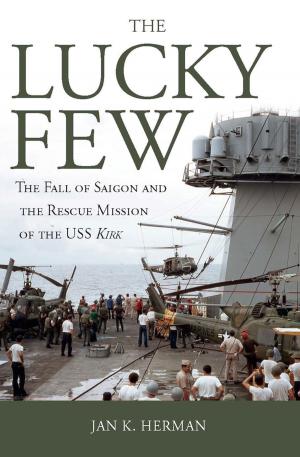The Elusive Enemy
U.S. Naval Intelligence and the Imperial Japanese Fleet
Nonfiction, History, Military, World War II| Author: | Douglas Ford | ISBN: | 9781612510651 |
| Publisher: | Naval Institute Press | Publication: | October 15, 2011 |
| Imprint: | Naval Institute Press | Language: | English |
| Author: | Douglas Ford |
| ISBN: | 9781612510651 |
| Publisher: | Naval Institute Press |
| Publication: | October 15, 2011 |
| Imprint: | Naval Institute Press |
| Language: | English |
In this exploration of U.S. naval operations and intelligence-gathering efforts, Douglas Ford introduces a new perspective on the clash between the United States and Japan in the Pacific. At the outset of the war, the U.S. Navy could not accurately determine the fighting efficiency of Japan’s Imperial Navy and land-based fighting forces. As the capabilities designed to improve intelligence gathering evolved, technology, ingenuity, and sheer luck often combined to produce useful, but incomplete, information. Only through combat over an extended period of time, Ford demonstrates, did the U.S. Navy actually identify the capabilities of its adversary. The intense combat produced a trove of information obtained from prisoners, captured weapons, and documents, and firsthand accounts of American naval personnel often provided some the most actionable intelligence of the war.
In recent years, a large number of documents related to intelligence activities during World War II has been declassified and made available in U.S. and British archives. As a result, a steady flow of work on the subject has emerged. However, much of the work on intelligence has focused on signals decrypts and clandestine operations. The subject of qualitative intelligence about the performance and fighting capabilities of the Imperial Japanese Navy has remained largely unexplored. The Elusive Enemy fills that void. As a historical case study, it demonstrates how intelligence plays a critical role in influencing the conduct of warfare and the manner in which threat perceptions influence international relations. It also serves as an explanation of cultural factors and their subsequent influence on U.S. and Japanese military practices. Finally, it is an innovative explanation of American perceptions regarding the Japanese during a critical period of history. Such a comprehensive examination of the impact of intelligence on the conduct of various campaigns is without parallel.
In recent years, a large number of documents related to intelligence activities during World War II has been declassified and made available in U.S. and British archives. As a result, a steady flow of work on the subject has emerged. However, much of the work on intelligence has focused on signals decrypts and clandestine operations. The subject of qualitative intelligence about the performance and fighting capabilities of the Imperial Japanese Navy has remained largely unexplored. The Elusive Enemy fills that void. As a historical case study, it demonstrates how intelligence plays a critical role in influencing the conduct of warfare and the manner in which threat perceptions influence international relations. It also serves as an explanation of cultural factors and their subsequent influence on U.S. and Japanese military practices. Finally, it is an innovative explanation of American perceptions regarding the Japanese during a critical period of history. Such a comprehensive examination of the impact of intelligence on the conduct of various campaigns is without parallel.
In this exploration of U.S. naval operations and intelligence-gathering efforts, Douglas Ford introduces a new perspective on the clash between the United States and Japan in the Pacific. At the outset of the war, the U.S. Navy could not accurately determine the fighting efficiency of Japan’s Imperial Navy and land-based fighting forces. As the capabilities designed to improve intelligence gathering evolved, technology, ingenuity, and sheer luck often combined to produce useful, but incomplete, information. Only through combat over an extended period of time, Ford demonstrates, did the U.S. Navy actually identify the capabilities of its adversary. The intense combat produced a trove of information obtained from prisoners, captured weapons, and documents, and firsthand accounts of American naval personnel often provided some the most actionable intelligence of the war.
In recent years, a large number of documents related to intelligence activities during World War II has been declassified and made available in U.S. and British archives. As a result, a steady flow of work on the subject has emerged. However, much of the work on intelligence has focused on signals decrypts and clandestine operations. The subject of qualitative intelligence about the performance and fighting capabilities of the Imperial Japanese Navy has remained largely unexplored. The Elusive Enemy fills that void. As a historical case study, it demonstrates how intelligence plays a critical role in influencing the conduct of warfare and the manner in which threat perceptions influence international relations. It also serves as an explanation of cultural factors and their subsequent influence on U.S. and Japanese military practices. Finally, it is an innovative explanation of American perceptions regarding the Japanese during a critical period of history. Such a comprehensive examination of the impact of intelligence on the conduct of various campaigns is without parallel.
In recent years, a large number of documents related to intelligence activities during World War II has been declassified and made available in U.S. and British archives. As a result, a steady flow of work on the subject has emerged. However, much of the work on intelligence has focused on signals decrypts and clandestine operations. The subject of qualitative intelligence about the performance and fighting capabilities of the Imperial Japanese Navy has remained largely unexplored. The Elusive Enemy fills that void. As a historical case study, it demonstrates how intelligence plays a critical role in influencing the conduct of warfare and the manner in which threat perceptions influence international relations. It also serves as an explanation of cultural factors and their subsequent influence on U.S. and Japanese military practices. Finally, it is an innovative explanation of American perceptions regarding the Japanese during a critical period of history. Such a comprehensive examination of the impact of intelligence on the conduct of various campaigns is without parallel.















